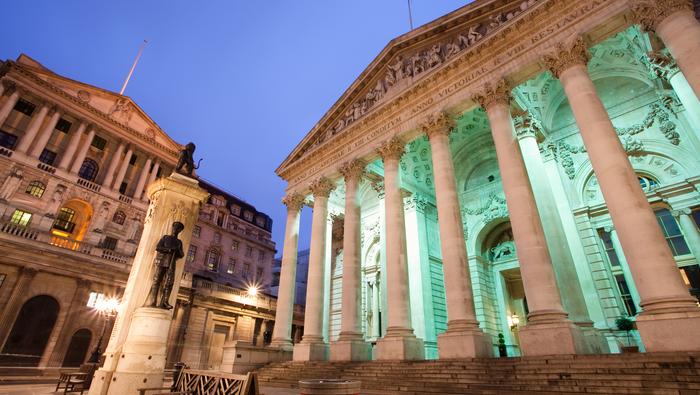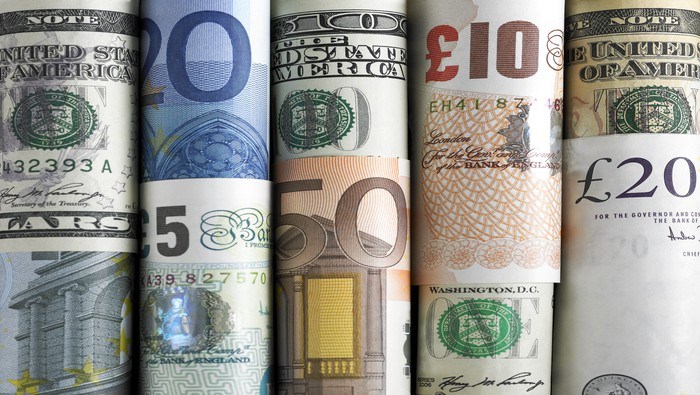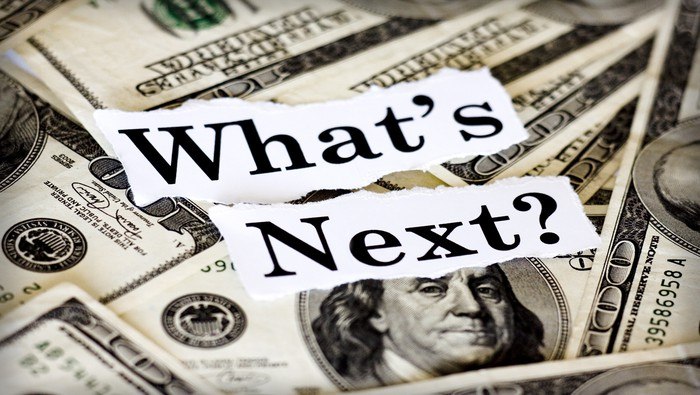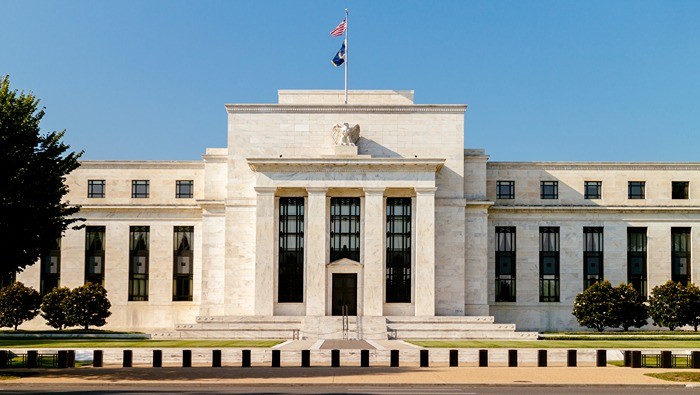Central bank independence pros and cons: main talking points:
- Central bank independence has several advantages.
- However, calls for a more democratic system for setting monetary policy are growing.
What central bank independence is and why it matters
For financial market traders, keeping a close eye on central bank monetary policy is essential as the mere hint of a change in interest rates or a more unconventional policy move, such as an increase or decrease in quantitative easing (QE), will affect the prices of assets from stocks and bonds to exchange rates and commodity prices.
For several decades now, these decisions have been taken in most advanced economies by independent central bankers, free of political interference. However, US President Donald Trump’s criticism of the Federal Reserve has cast a spotlight on that independence. Political influence on central banks like the Fed is seen widely as an unwelcome retrograde step, yet there are strong arguments in favor of it and any moves in that direction would mean that traders would have to switch their focus to government policy.
The case for central bank independence
Supporters of central bank independence have been horrified by Trump’s attacks on the Fed. In one of many critiques, he told Fox Business Network in June 2019 that Fed chair Jerome Powell was “not doing a good job,” adding that the Fed’s policy of raising interest rates and cutting back on QE had gone too far and was “insane”. Two months later he said: “The only problem we have is Jay Powell and the Fed,” adding that “so far he has called it wrong and only let us down.”
Trump has also said that he would not try to stop Powell if he offered to resign and questioned whether Powell or Chinese leader Xi Jinping was the “bigger enemy” of the US. He has criticised the Fed too for not acting as quickly as the European Central Bank in providing economic stimulus.
Quantitative Easing (QE) Explained: Central Bank Tool for Growth
Trump’s critics have plenty of ammunition. In a paper dated March 2017, the Fed itself said “Careful empirical studies support the view that central banks able to conduct day-to-day monetary policy operations free of political pressure tend to deliver better inflation outcomes, without compromising economic growth.”
That the Fed should argue for its own independence is, of course, unsurprising. However, it is by no means alone. A spokesman for the International Monetary Fund said 15 years ago that “There’s a consistent message in our policy advice that independent central banks are essential to effective monetary policy.” Five years later, in an open letter to the US Congress and the Executive Branch, 386 economists said central bank independence has been shown to be essential for controlling inflation.
The Federal Reserve: A Forex Trader’s Guide
More recently, the editorial board of the Financial Times newspaper argued that central bank “decisions must be guided by a determination neither to give in to political pressure nor to keep policy unnecessarily tight purely to defy it.” A leader in The Economist opined that the success of central banks in controlling inflation and interest rates “is threatened by a confluence of populism, nationalism and economic forces that are making monetary policy political again.”
One particular concern for those who support central bank independence is that governments might be tempted to ease monetary policy before an election to boost their campaigns, leading to policy being determined by election cycles rather than the needs of the economy. Ceding control to a President, Parliament or even a popular vote might therefore lead to policy mistakes. Moreover, politicians are unlikely to have the technical expertise that central bankers have.
The case against central bank independence
However, there is a counter argument: central bankers are unelected, a lack of political oversight is undemocratic and monetary policy should complement fiscal policy. Monetary policy has failed several times, most notably during the Great Depression of the 1930s, and political intervention might have prevented more recent failures. Monetary and fiscal policies should work together; when each is controlled separately they might well pull in opposite directions; and there may be evidence that monetary policy needs political intervention to ensure it helps all members of society, not just a few.
An article published in Foreign Affairs in December 2017 was headlined “Bring Politics Back to Monetary Policy” and argued that technocratic exceptionalism fuels populism. The author, Professor Jacqueline Best of the School of Political Studies at the University of Ottawa, wrote that “central banks play a paradoxical role in today’s liberal democracies. Their work is highly technical, yet the consequences of their actions are inevitably political, producing big winners and losers.”
She added: “They wield great power in democratic societies, and yet they are unelected – because of the fear that politicians tend to push up inflation to appease their bases unless interest rate policy is insulated from democratic pressures.”
Hawkish vs Dovish: How Monetary Policy Affects FX Trading
A year earlier, the then UK Prime Minister Theresa May argued that “While monetary policy with super-low rates and quantitative easing have provided emergency medicine, we have to acknowledge some of the bad side effects. People with assets have got richer, while people without have not… A change has got to come.”
That prompted Fran Boait, Executive Director of campaign group Positive Money, to write in The Guardian newspaper: “It’s becoming clear that monetary policy has impacts that are of enormous political significance, and it isn’t being closely scrutinised by [the UK] parliament.”
“More economists and politicians are waking up to the fact that you can’t carry out monetary and fiscal policy operating in total isolation, and if we want to rebalance our economy away from housing bubbles and an oversized financial sector, then monetary policy needs a serious rethink,” she added.
The Pros and Cons of Central Bank Independence
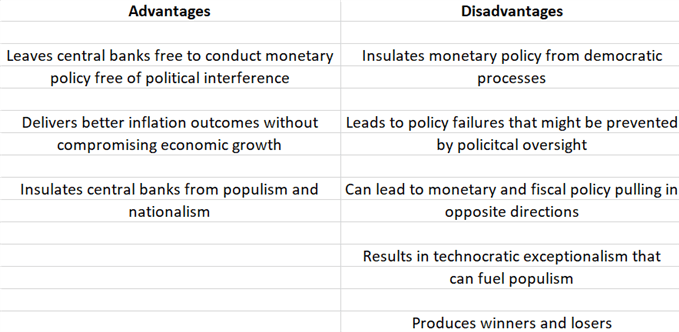
In many countries, central bank independence is still fairly new. In the UK, for example, it only dates back to 1997, when it was announced by the then Chancellor of the Exchequer, Gordon Brown, that the Bank of England would be granted operational independence over monetary policy.
Prior to that, Brown’s predecessor as Chancellor, Kenneth Clarke, and the Governor of the Bank of England, the late Eddie George, had been starring in what the City and the media called “The Ken and Eddie Show”, in which policy was set by the two of them working together.
Today, those supporting central bank independence are in a clear majority but the voices against are growing louder. Economics Professor Andrew Mountford of Royal Holloway, University of London, has argued that “the control of the amount of credit in the economy and the control of the banking sector more generally is intrinsically political. … The idea that control of this sector should be removed from government and thus ultimately from accountability to those that the system is supposed to work for (the general public) is economically ludicrous … and politically terrifying.”
As these voices grow, change seems inevitable. In a column on VoxEU.org, the policy portal of the Centre for Economic Policy Research, it was noted that several authors have highlighted “intricacies for central banks associated with greater international monetary and financial interdependence. So far, neither development seems to have materially constrained central banks’ room for manoeuvre. But this could easily change in the future, in particular if calls for qualifying central banks’ independence are made.”
This view is supported by Professor Larry Summers of Harvard University, a former US Treasury Secretary. In remarks written for a conference in September 2017 he argued that “the case for central bank independence today is much weaker than it was 20 years ago” and that “institutional evolution in major countries is both likely and desirable over the next couple of decades.”
Central bank independence and trading
For day traders, this debate hardly matters. However, for those with a longer timeframe, moves towards more political oversight, as in countries like China, need to be watched carefully as they would switch the focus from central bankers to politicians when assessing likely moves in asset prices. They might also help reduce market distortions caused by QE and negative interest rates, and therefore lead to improvements in market pricing.
How Central Banks Impact the Forex Market
Resources to help you trade the markets:
Whether you are a new or an experienced trader, at DailyFX we have many resources to help you:
- Analytical and educational webinars hosted several times per day,
- Trading guides to help you improve your trading performance,
- A guide specifically for those who are new to forex,
- And you can learn how to trade like an expert by reading our guide to the Traits of Successful Traders.
--- Written by Martin Essex, Analyst and Editor
Feel free to contact me via the comments section below, via email at martin.essex@ig.com or on Twitter @MartinSEssex


